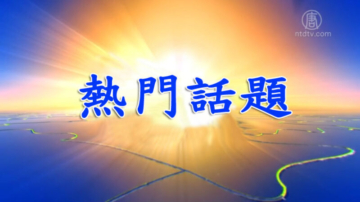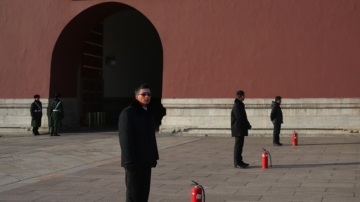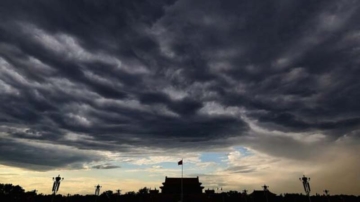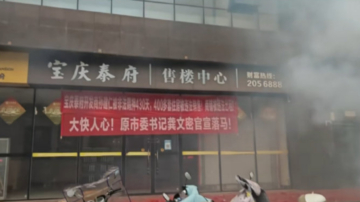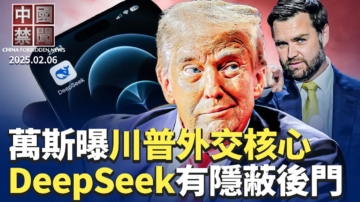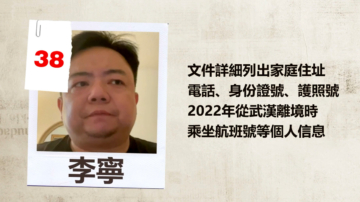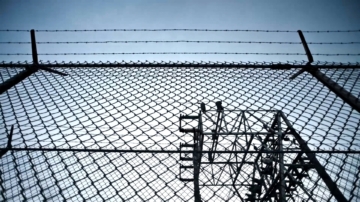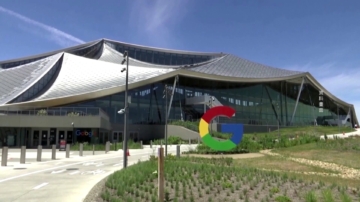【新唐人2014年10月29日訊】中共黨媒日前公布了3名所謂台灣間諜的個人資料,指稱他們策反大陸赴臺留學生、大陸遊客以及大陸新娘,來獲取大陸政經和軍事情報。有分析指出,北京這一波高調公布間諜案,是衝著台灣總統馬英九的「雙十講話」來的。
10月27號,中共喉舌《人民報》旗下《環球時報》報導指稱,台灣間諜透過問卷調查、提供兼職等方式,接觸大陸在臺學生,之後有償獲取大陸政治、經濟、軍事相關政策和涉密資訊,還會建議學生返回大陸後,積極報考公職,並「給予備考資助」。
報導說,中共有關部門已經掌握3名台灣間諜,並公布他們的姓名、身份證字號等詳細個人資料。報導聲稱,多名臺諜曾在台灣大學、中山大學、義守大學等20多所高校活動。
報導還說,除了大陸留學生,大陸遊客和嫁給台灣人的大陸新娘,也成為台灣間諜的刺探和發展目標。
中共國臺辦發言人范麗青表示高度關注有關報導,並要求台灣有關方面立即停止此類行為。不過,台灣國安局嚴正聲明,從未在校園內從事任何情報工作。台灣教育部次長陳德華也表示,從來沒聽過這樣的事情,並且會向各大學詢問了解。
28號,香港《明報》發表評論文章指出,中共在兩岸諜戰史中的慣常做法是「只做不說」,一旦大張旗鼓,必有對臺北不滿的政治用意,這一波高調的間諜案曝光,顯然是衝著馬英九的「雙十講話」而來的。
時政評論員伍凡:「馬英九在10月10號講話,提到讓中國人民一部份人先民主起來,他指的就是香港,香港屬於中國,讓這個地方先民主,真正讓它有普選。這個話講出來,北京非常不高興,說他說三道四,現在就拿這些中國大陸的學生到台灣去留學,說是被台灣的情報機構吸收了。這是給台灣施加壓力。」
台灣智庫諮詢委員董立文:「中共故意公佈這些事情,其實是在製造兩岸關係敵對的意識,升高這種敵對的意識,馬政府跟北京的關係,現在正處於低潮跟冷淡之中,這個低潮跟冷淡是很多事情促成的,譬如說,馬習會的破局,以及馬英九總統的雙十講話,談到了中國大陸民主,也支持了香港的佔中運動,國臺辦有非常公開的、高調的批評,是一連串的發展。」
文章還說,大陸利用曝光台灣間諜來表達對台灣當局的不滿早有先例。1999年李登輝拋出「兩國論」,北京就高調宣佈破獲軍隊中的臺諜劉連昆少將案﹔2003年陳水扁宣佈翌年將舉辦公投,並提出「一邊一國」口號後,年底北京就公布8名台灣間諜在大陸落網。這一次,北京也是借臺諜案敲打台灣執政者。
伍凡:「它(中共)看到,香港現在走到這個地步,根本不聽北京的,香港和台灣之間關係又很密切,雙方有抵抗中共的需求,也有實際合作的可能,尤其是年輕人,太陽花支持雨傘運動,雨傘運動以前向台灣學,這一點讓北京看的心裡很膽戰心驚,很害怕,再加上馬英九又出來講話,等於是替年輕人打氣,所以北京就給台灣施加壓力。」
台灣智庫諮詢委員董立文指出,中共黨媒高調公布間諜案,除敲打台灣執政者外,還有另外一層用意。
董立文:「台灣的立法院最近才對陸生所謂的『三限六不』剛剛鬆綁,台灣是預期法律上的放寬,待遇上更加的照顧陸生,預期能有更多的陸生來台灣留學,中共媒體公佈這樣的案例,其實是打擊了中國大陸的學生來台灣留學的意願。」
台灣近年來公民運動風起雲湧,許多陸生來臺後,感受到自由民主的氛圍,甚至還有陸生參與台灣各項抗爭活動。中國盲人維權律師陳光誠曾形容,陸生來臺學習有如經歷「排毒」過程,排出中共持續灌輸給他們的思想毒素。
董立文認為,中共並不想讓更多陸生來臺,所以才利用媒體放話,繪聲繪影,以降低陸生來臺意願。
採訪/易如 編輯/陳潔 後製/周天
Beijing: Taiwan Instigates Mainland Students Spying
Communist Party mouthpiece recently reported three Taiwan
spies who obtained intelligence from recruiting mainlanders
such as students studying in Taiwan, tourists and women
married to Taiwanese.
This spy case announcement was analyzed as the CCP's revenge
for what Taiwan President Ma Ying-jeou had said
on the National Birthday, Oct. 10.
The CCP mouthpiece Global Times reported on Oct. 27 that
Taiwan spies had connected to mainlanders in Taiwan through
surveys, part-time job placement in exchange for information
on mainland politics, economy, and confidential matters.
Students were also encouraged to engage in public office jobs
and promised financial assistance for government job
examinations in China.
The names and personal information such as the ID of three
Taiwan spies were revealed in the report.
It also claimed that many Taiwan spies have conducted
activities in more than 20 universities and colleges in Taiwan.
Other than students from mainland, Chinese tourists
and women married to Taiwanese were also the targets
and development goals of the spies, added the report.
CCP's Taiwan Affairs Office spokesperson, Fan Liqing, expressed
concern about the report,
and demanded that the Taiwan authorities immediately
stop such activities.
However, Taiwan's National Security Bureau solemnly denied
the report.
Political Deputy Minister, Chen Der-hwa, of Taiwan's Ministry
of Education said that he has never heard of such a thing,
and will seek information from each university.
On the 28th, Hong Kong's Ming Pao commented that
the CCP's intelligence activities have remained on the "action"
not the "words".
Once it is publicized, there must be some political intentions
against Taipei.
This wave of high-profile espionage case exposure
is clearly directed at Ma Ying-jeou's national address on Oct. 10.
Current affairs commentator Wu Fan: "Ma Ying-jeou talked
about letting some Chinese enjoy democracy in his speech,
referring to the democracy in Hong Kong.
That means to allow real universal suffrage in Hong Kong.
Beijing was very upset about his words,
referring to it as irresponsible.
Now Beijing claims mainland students are manipulated
to become spies for Taiwan. It is to pressure Taiwan."
Taiwan Think Tank Advisory Committee Tung Li-wen:
"The CCP has deliberately reported these to manipulate
cross-strait antagonism and elevate the hostile relations.
Ma government and Beijing are in a low and cold situation
which has been manufactured through a series of developments,
such as the break-up of Ma and Xi's meeting,
the Oct. 10 talk of President Ma about democracy in China
and his support for Hong Kong's Occupy Central,
and the high-profile criticism from the CCP's Taiwan Affairs Office."
Ming Pao also added that there were precedents for delivering
CCP complaints through exposing Taiwan spies in the past.
In 1999 when then President Lee Teng-hui brought up
the Special State-to-State Relations, Beijing announced
the crack down on the military spy, Major General Liu Liankun;
In 2003 when then President Chen Shui-bian announced that
a referendum would be held the following year
and the One Country on Each Side concept,
Beijing announced the capture of 8 Taiwan spies.
This time, the Taiwan spy case was manipulated again
to beat the Taiwan leader.
Wu Fan: "It is clear that Hong Kong has come to this point
of disobeying Beijing;
the close relationship between Hong Kong and Taiwan
and their resistance to the CCP have shown
the potential of practical cooperation,
especially among the youngsters.
The Sunflowers support the Umbrella,
and the Umbrella Movement was copying from Taiwan.
Beijing is frightened.
Ma Ying-jeou's speech was tantamount to a cheer
for the young people, so Beijing is applying pressure on Taiwan. "
Tung Li-wen indicates that other than to hit Taiwan's government,
the spy case was announced with another intention.
Tung Li-wen: "Taiwan's Legislative Yuan has only recently
relaxed the restrictions on mainland students in Taiwan.
This beneficial policy is expected to welcome more
mainlanders to study in Taiwan.
The spy case will in fact defeat the mainland students'
will to study in Taiwan."
The surging citizen movement in Taiwan in recent years
has many mainland students experience freedom and democracy.
Some of them have even participated in various protests in Taiwan.
Chinese blind activist lawyer Chen Guangcheng has described
the learning experience of mainland students in Taiwan
as a process of "detoxification".
It will help to discharge the Communist toxins instilled in their minds.
Tung Li-wen does not believe the CCP would like to see
more mainlanders study in Taiwan.
The media exposure of the spy case was intended to reduce
their willingness to pursue study in Taiwan.
Interview/YiRu Edit/ChenJie Post-Production/ZhouTian
10月27號,中共喉舌《人民報》旗下《環球時報》報導指稱,台灣間諜透過問卷調查、提供兼職等方式,接觸大陸在臺學生,之後有償獲取大陸政治、經濟、軍事相關政策和涉密資訊,還會建議學生返回大陸後,積極報考公職,並「給予備考資助」。
報導說,中共有關部門已經掌握3名台灣間諜,並公布他們的姓名、身份證字號等詳細個人資料。報導聲稱,多名臺諜曾在台灣大學、中山大學、義守大學等20多所高校活動。
報導還說,除了大陸留學生,大陸遊客和嫁給台灣人的大陸新娘,也成為台灣間諜的刺探和發展目標。
中共國臺辦發言人范麗青表示高度關注有關報導,並要求台灣有關方面立即停止此類行為。不過,台灣國安局嚴正聲明,從未在校園內從事任何情報工作。台灣教育部次長陳德華也表示,從來沒聽過這樣的事情,並且會向各大學詢問了解。
28號,香港《明報》發表評論文章指出,中共在兩岸諜戰史中的慣常做法是「只做不說」,一旦大張旗鼓,必有對臺北不滿的政治用意,這一波高調的間諜案曝光,顯然是衝著馬英九的「雙十講話」而來的。
時政評論員伍凡:「馬英九在10月10號講話,提到讓中國人民一部份人先民主起來,他指的就是香港,香港屬於中國,讓這個地方先民主,真正讓它有普選。這個話講出來,北京非常不高興,說他說三道四,現在就拿這些中國大陸的學生到台灣去留學,說是被台灣的情報機構吸收了。這是給台灣施加壓力。」
台灣智庫諮詢委員董立文:「中共故意公佈這些事情,其實是在製造兩岸關係敵對的意識,升高這種敵對的意識,馬政府跟北京的關係,現在正處於低潮跟冷淡之中,這個低潮跟冷淡是很多事情促成的,譬如說,馬習會的破局,以及馬英九總統的雙十講話,談到了中國大陸民主,也支持了香港的佔中運動,國臺辦有非常公開的、高調的批評,是一連串的發展。」
文章還說,大陸利用曝光台灣間諜來表達對台灣當局的不滿早有先例。1999年李登輝拋出「兩國論」,北京就高調宣佈破獲軍隊中的臺諜劉連昆少將案﹔2003年陳水扁宣佈翌年將舉辦公投,並提出「一邊一國」口號後,年底北京就公布8名台灣間諜在大陸落網。這一次,北京也是借臺諜案敲打台灣執政者。
伍凡:「它(中共)看到,香港現在走到這個地步,根本不聽北京的,香港和台灣之間關係又很密切,雙方有抵抗中共的需求,也有實際合作的可能,尤其是年輕人,太陽花支持雨傘運動,雨傘運動以前向台灣學,這一點讓北京看的心裡很膽戰心驚,很害怕,再加上馬英九又出來講話,等於是替年輕人打氣,所以北京就給台灣施加壓力。」
台灣智庫諮詢委員董立文指出,中共黨媒高調公布間諜案,除敲打台灣執政者外,還有另外一層用意。
董立文:「台灣的立法院最近才對陸生所謂的『三限六不』剛剛鬆綁,台灣是預期法律上的放寬,待遇上更加的照顧陸生,預期能有更多的陸生來台灣留學,中共媒體公佈這樣的案例,其實是打擊了中國大陸的學生來台灣留學的意願。」
台灣近年來公民運動風起雲湧,許多陸生來臺後,感受到自由民主的氛圍,甚至還有陸生參與台灣各項抗爭活動。中國盲人維權律師陳光誠曾形容,陸生來臺學習有如經歷「排毒」過程,排出中共持續灌輸給他們的思想毒素。
董立文認為,中共並不想讓更多陸生來臺,所以才利用媒體放話,繪聲繪影,以降低陸生來臺意願。
採訪/易如 編輯/陳潔 後製/周天
Beijing: Taiwan Instigates Mainland Students Spying
Communist Party mouthpiece recently reported three Taiwan
spies who obtained intelligence from recruiting mainlanders
such as students studying in Taiwan, tourists and women
married to Taiwanese.
This spy case announcement was analyzed as the CCP's revenge
for what Taiwan President Ma Ying-jeou had said
on the National Birthday, Oct. 10.
The CCP mouthpiece Global Times reported on Oct. 27 that
Taiwan spies had connected to mainlanders in Taiwan through
surveys, part-time job placement in exchange for information
on mainland politics, economy, and confidential matters.
Students were also encouraged to engage in public office jobs
and promised financial assistance for government job
examinations in China.
The names and personal information such as the ID of three
Taiwan spies were revealed in the report.
It also claimed that many Taiwan spies have conducted
activities in more than 20 universities and colleges in Taiwan.
Other than students from mainland, Chinese tourists
and women married to Taiwanese were also the targets
and development goals of the spies, added the report.
CCP's Taiwan Affairs Office spokesperson, Fan Liqing, expressed
concern about the report,
and demanded that the Taiwan authorities immediately
stop such activities.
However, Taiwan's National Security Bureau solemnly denied
the report.
Political Deputy Minister, Chen Der-hwa, of Taiwan's Ministry
of Education said that he has never heard of such a thing,
and will seek information from each university.
On the 28th, Hong Kong's Ming Pao commented that
the CCP's intelligence activities have remained on the "action"
not the "words".
Once it is publicized, there must be some political intentions
against Taipei.
This wave of high-profile espionage case exposure
is clearly directed at Ma Ying-jeou's national address on Oct. 10.
Current affairs commentator Wu Fan: "Ma Ying-jeou talked
about letting some Chinese enjoy democracy in his speech,
referring to the democracy in Hong Kong.
That means to allow real universal suffrage in Hong Kong.
Beijing was very upset about his words,
referring to it as irresponsible.
Now Beijing claims mainland students are manipulated
to become spies for Taiwan. It is to pressure Taiwan."
Taiwan Think Tank Advisory Committee Tung Li-wen:
"The CCP has deliberately reported these to manipulate
cross-strait antagonism and elevate the hostile relations.
Ma government and Beijing are in a low and cold situation
which has been manufactured through a series of developments,
such as the break-up of Ma and Xi's meeting,
the Oct. 10 talk of President Ma about democracy in China
and his support for Hong Kong's Occupy Central,
and the high-profile criticism from the CCP's Taiwan Affairs Office."
Ming Pao also added that there were precedents for delivering
CCP complaints through exposing Taiwan spies in the past.
In 1999 when then President Lee Teng-hui brought up
the Special State-to-State Relations, Beijing announced
the crack down on the military spy, Major General Liu Liankun;
In 2003 when then President Chen Shui-bian announced that
a referendum would be held the following year
and the One Country on Each Side concept,
Beijing announced the capture of 8 Taiwan spies.
This time, the Taiwan spy case was manipulated again
to beat the Taiwan leader.
Wu Fan: "It is clear that Hong Kong has come to this point
of disobeying Beijing;
the close relationship between Hong Kong and Taiwan
and their resistance to the CCP have shown
the potential of practical cooperation,
especially among the youngsters.
The Sunflowers support the Umbrella,
and the Umbrella Movement was copying from Taiwan.
Beijing is frightened.
Ma Ying-jeou's speech was tantamount to a cheer
for the young people, so Beijing is applying pressure on Taiwan. "
Tung Li-wen indicates that other than to hit Taiwan's government,
the spy case was announced with another intention.
Tung Li-wen: "Taiwan's Legislative Yuan has only recently
relaxed the restrictions on mainland students in Taiwan.
This beneficial policy is expected to welcome more
mainlanders to study in Taiwan.
The spy case will in fact defeat the mainland students'
will to study in Taiwan."
The surging citizen movement in Taiwan in recent years
has many mainland students experience freedom and democracy.
Some of them have even participated in various protests in Taiwan.
Chinese blind activist lawyer Chen Guangcheng has described
the learning experience of mainland students in Taiwan
as a process of "detoxification".
It will help to discharge the Communist toxins instilled in their minds.
Tung Li-wen does not believe the CCP would like to see
more mainlanders study in Taiwan.
The media exposure of the spy case was intended to reduce
their willingness to pursue study in Taiwan.
Interview/YiRu Edit/ChenJie Post-Production/ZhouTian

